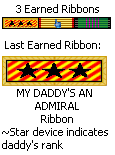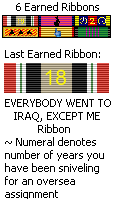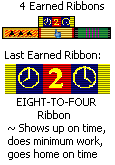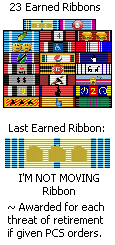
 |
|
|||||||
|
Family Members join our new Facebook group sponsored by NavyDEP: https://www.facebook.com/groups/Rtcgreatlakes
|
 |
|
|
Thread Tools | Display Modes |
|
|
#1 |
|
Administrator
 Join Date: Dec 2008
Location: Centennial, Colorado
Posts: 2,767
Rep Power: 285  |
(CTI) Cryptologic Technician (Interpretive)
(CTM) Cryptologic Technician (Maintenance) (CTN) Cryptologic Technician (Networks) (CTR) Cryptologic Technician (Collection) (CTT) Cryptologic Technician (Technical) - CTIs or Interpretive Cryptologic Technicians handle radiotelephone communications and foreign language translation. - CTMs or Maintenance Cryptologic Technicians maintain electronic and electromechanical equipment. - CTNs or Networking Cryptologic Technicians handle computer communication. - CTRs or Collection Cryptologic Technicians handle all Morse code communications and operate radio direction-finding equipment. - CTTs or Technical Cryptologic Technicians deal with Electronic Warfare. CTTs are the first line of defense against inbound threats and Anti-Ship missiles. They also collect, analyze, and provide electronic intelligence support to commands throughout the world. ----------------------------------------------- CTI - Cryptologic Technicians (CTI's) Interpretive are the Navy's linguists. CTIs attend language training at the Defense Language Institute (DLI), in Monterey, California. They specialize in the analysis of foreign language materials and the preparation of statistical studies and technical reports. Language training is open to men and women in Arabic, Chinese, Korean, Persian-Farsi, Russian, and Spanish. Additional languages are available to CTIs that qualify for an additional language. New recruits cannot get a guaranteed language in their enlistment contract. Language assignment is determined at DLI based on aptitude, school quotas, and Navy requirements. The duties performed by CTIs include:
CTI's normally work in clean, comfortable office-type or small technical laboratory-type environments while on shore duty. Sea duty is performed on a variety of air, surface and subsurface platforms. At times they are closely supervised but often work independently or in small, coordinated teams. Their work is of high interest to command and decision-making levels. It is mostly mental, involving foreign language materials. CTIs may be assigned to temporary duty aboard Navy aircraft. Additionally, male CTI members may be assigned to duties aboard a Navy submarine. A-School (Job School) Information
Other Requirements
CTI's can expect a rotation of one INCONUS tour, followed by one OUTCONUS tour, ect., during their careers. ----------------------------------------------- CTM - The Cryptologic Technician Maintenance branch offers a career in the installation, configuration, diagnosis, and repair of state-of-the-art electronic, computer, and network hardware and software systems. The duties performed by CTMs include:
CTM are assigned to equipment installation activities, electronic maintenance, and computer networking system departments and divisions. They may be assigned to either day work or shift work in a large facility or one of the individual or two-person independent duty assignments at sea or ashore. Departments and divisions are usually divided into specialized maintenance shops and are normally air-conditioned, well-lighted, and completely equipped. A-School (Job School) Information
Other Requirements
----------------------------------------------- CTN - The Cryptologic Technician - Networks branch offers a career in computer Networks. CTN's perform a variety of duties associated with computer network operations across global networks. About 600 men and women serve worldwide in the CTN rating. Advanced training in computer network operations, using state-of-the-art technology is readily available. Within a short period, today’s CTN quickly develops highly marketable computer network skills. A combination of technical and analytical computer network skills provides the situational awareness required to plan and execute informational operations (IO) actions/counter-actions. Initial training is located in Pensacola, Florida. Duties performed by CTNs include:
CTN's are assigned to computer networking system departments and divisions. They may be assigned to either day work or shift work in a large facility or one of the individual or two-person independent duty assignments at sea or ashore. Departments and divisions are usually divided into specialized mission area shops and are normally air-conditioned, well-lighted, and completely equipped. A-School (Job School) Information Corry Station, FL/Pensacola, FL - Around 6 months Security Clearance Requirement: Top Secret (Single Scope Background Investigation Required) Other Requirements
CTNs can expect a rotation of one INCONUS tour, followed by two OUTCONUS tour, ect., until they reach the rank of E-8. E-8s and E-9s can expect a rotation of one INCONUS four, foollowed by one OUTCONUS tour, ect., during their careers. -------------------------------------- CTR perform a variety of duties worldwide at numerous overseas and stateside shore commands, aboard surface ships, aircraft and submarines. Duties include performing collection, analysis and reporting on communication signals using computers, specialized computer-assisted communications equipment, video display terminals and electronic/magnetic tape recorders. The duties performed by CTRs include:
CTR functions are performed indoors at various shore activities and aboard ships, submarines or aircraft. Personnel may expect a clean, orderly working space, frequent contact and coordination with others and close supervision. CTRs may be assigned to temporary duty aboard Navy aircraft. Additionally, male CTR members may be assigned to duties aboard a Navy submarine. A-School (Job School) Information
Other Requirements
CTRs can expect a rotation of one INCONUS tour, followed by two OUTCONUS tour, ect., -------------------------------------- CTT Cryptologic Technicians (Technical) perform a variety of specialized duties associated with the collection and processing of airborne, shipborne, and land-based radar signals. They operate electronic intelligence receiving and direction finding systems, digital recording devices, analysis terminals, and associated computer equipment. Systems they operate produce high-power jamming signals used to deceive electronic sensors and defeat radar guided weapons systems. Additionally, intelligence derived from collection and processing update national databases which are crucial to tactical and strategic units throughout the world. The duties performed by CTTs include:
CTT functions are performed in clean, orderly, air-conditioned spaces, with little supervision. Personnel in the CTT ratings normally work with other intelligence and cryptology specialists on tasks that require more mental than physical effort. A-School (Job School) Information Pensacola, FL -- 82 calendar days (Note those that enlist under the Advanced Electronics Field option will undergo further advanced training) Security Clearance Requirement: Top Secret (Single Scope Background Investigation Required) Other Requirements
For CTTs signed under the AEF program (6 year enlistment), and those with NECs 173 X and 1702, the first sea tour will be 48 months due to the length of iniital training. Note: Cryptologic Technician now includes the former rating of Electronic Warfare Technician (EW).
__________________
    
|
|
|

|
|
|
#2 |
|
Member
 Join Date: Nov 2011
Location: Wahiawa, HI
Posts: 59
Rep Power: 12  |
Craig,
Thank you very much for all of this info. I had been searching for more info on what CTR really was, and I'm satisfied. |
|
|

|
|
|
#3 |
|
Senior Member
 Join Date: Jun 2013
Location: Minneapolis, MN
Posts: 204
Rep Power: 26  |
What are INCONUS and OUTCONUS?
|
|
|

|
|
|
#4 |
|
Member
 Join Date: Jul 2013
Posts: 75
Rep Power: 13  |
in the states/ over seas
__________________
I do not fear failure. I only fear the slowing up of the engine inside of me which is pounding, saying, keep going, someone must be on top, why not you?" |
|
|

|
|
|
#5 |
|
Senior Member
 Join Date: Jun 2013
Location: Minneapolis, MN
Posts: 204
Rep Power: 26  |
which one happens first after A School? for example i know that at least with most rates, people go on sea duty right after A School.
|
|
|

|
|
|
#6 |
|
Senior Member
 Join Date: Oct 2010
Posts: 2,858
Rep Power: 343    |
It's where your homeport is.
And for that it really depends on what the needs of the navy are. Unless you have dependents, in which case it's very unlikely you'll be stationed over seas for your first duty station.
__________________
 Officers: making simple stuff hard since 1775 Officers: making simple stuff hard since 1775  ACTIVE DUTY SAILORS - Click here to have your account verified |
|
|

|
|
|
#7 |
|
Senior Member
 Join Date: Jun 2013
Location: Minneapolis, MN
Posts: 204
Rep Power: 26  |
On the jobs sheet that my recruiter gave me it said that about half of CTRs go on to a C School after A School. Does anybody know how it would determined by the Navy, as to whether or not I would have a C School after my A School. Additionally, due to the fact that males can get on subs, I'm very interested in being able to serve on a sub. Is there a specific career track within the CTR rate that I would need to get into in order to get on a sub?
|
|
|

|
|
|
#8 | |
|
Member
 Join Date: Jan 2013
Location: Pensacola
Posts: 69
Rep Power: 13  |
Quote:
__________________
"A ship in port is safe, but that is not what ships are built for."-RADM Hopper |
|
|
|

|
 |
|
|